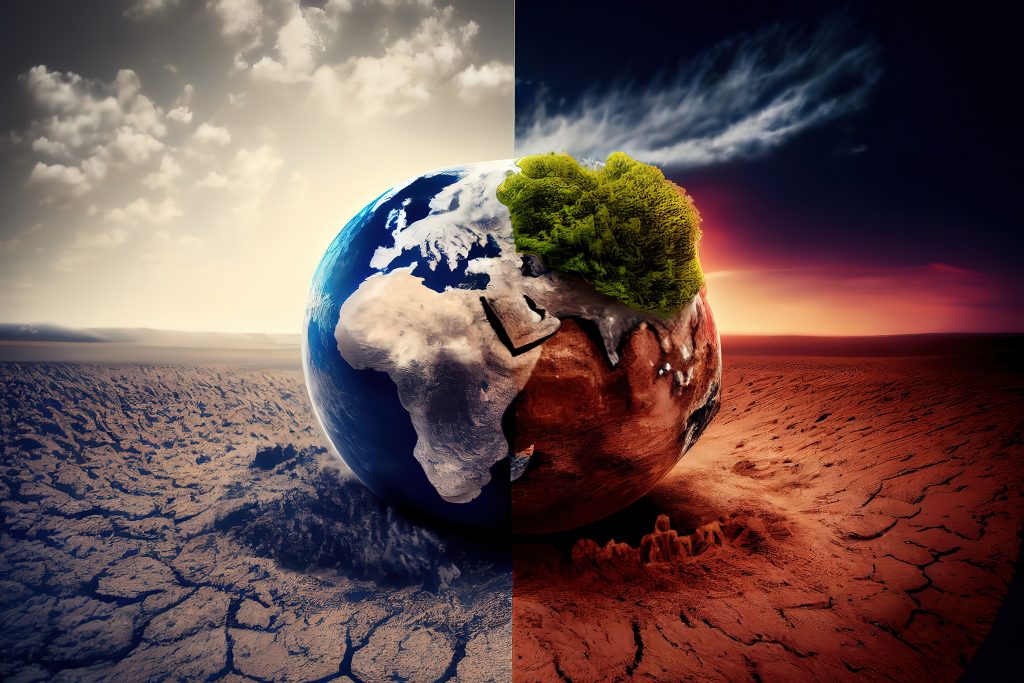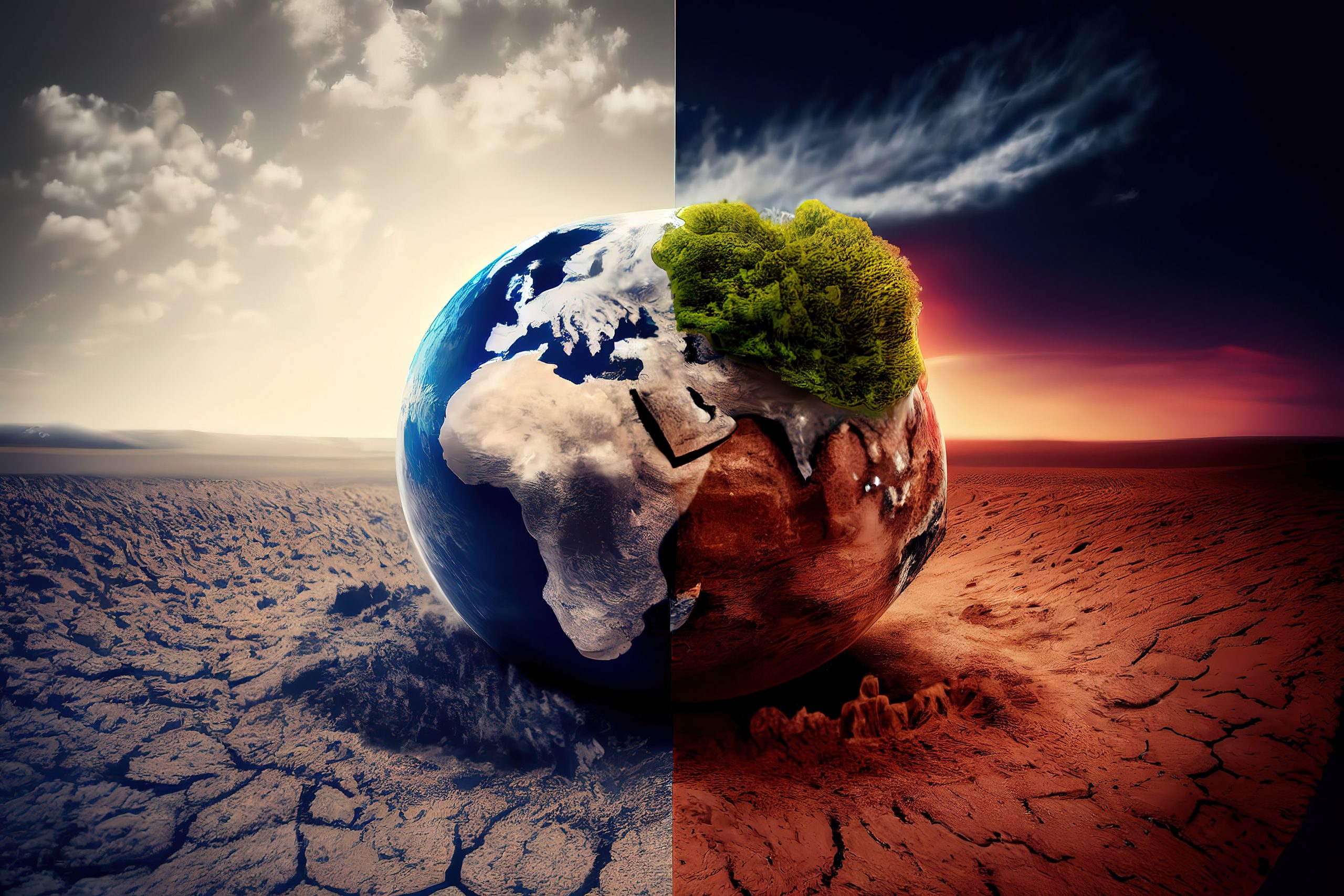Artificial Weather: A Global Storm In A Tea Cup
Artificial weather is a topical argument that governments have debated for decades. This conversation lesson plan will highlight how to compare, contrast, express an opinion, and use common prepositions. Build spoken confidence and apply the theory in English as a second language.
There are two schools of thought on whether societies should future-proof against droughts, flooding, and food shortages. Our planet is heating up, and spotlight debates about how we should or shouldn’t combat rising temperatures have been an ongoing topical subject for decades.

Schools Of Thought
There are two schools of thought on whether societies should future-proof against droughts, flooding, and food shortages. Our planet is heating up, and spotlight debates about how we should or shouldn’t combat rising temperatures have been an ongoing topical subject for decades.
With no end in sight, some countries have considered turning to technology as a possible solution. The environment is a hot topic for most exam bodies and, as such, should be researched to build vocabulary and confidence.
Conversation Course
In this conversation class, we will debate the concept of producing heat and rain artificially and how it could deviate from a very certain outcome. You will learn how to express yourself in English as a second language. In particular; voice tones, comparative and superlative, use of common prepositions and interaction skills.
China’s ambitious endeavours in the field of weather manipulation have sparked intense ethical debates worldwide. With the ability to create artificial rain and even simulate the sun, China’s scientific advancements have raised concerns about the potential consequences and ethical implications of playing with nature. This article will explore the ethical dilemmas associated with China’s pursuit of artificial weather, exploring the benefits, risks, and the need for responsible innovation in this rapidly evolving field.
The Promise of Artificial Rain:
China’s efforts to create artificial rain have been driven by many factors, including addressing water scarcity, mitigating droughts, and enhancing agricultural productivity. By deploying cloud seeding techniques, such as dispersing chemicals into clouds to induce precipitation, China aims to alleviate water shortages and ensure food security. However, critics argue that manipulating rainfall patterns may have unintended ecological consequences, disrupting natural ecosystems and exacerbating environmental imbalances.
Unleashing the Artificial Sun:
China’s pursuit of an artificial sun, a nuclear fusion reactor known as the “Artificial Sun,” has garnered both excitement and apprehension. This groundbreaking project aims to replicate the process that powers the sun, potentially unlocking a virtually limitless source of clean and sustainable energy. However, the ethical concerns surrounding nuclear fusion technology are significant, as it involves handling radioactive materials and the potential for nuclear accidents. Striking a balance between scientific progress and the safety of humans and the environment becomes crucial in this context.
Ethical Considerations:
The ethical debate surrounding China’s weather manipulation efforts revolves around several key considerations:
- Critics argue that tampering with the weather interferes with the natural order of the environment, potentially leading to unforeseen consequences.
- Concerns about the transparency and accountability of the research and development process have been raised, emphasising the need for open dialogue and international collaboration.
- Questions arise regarding the equitable distribution of the benefits and risks associated with artificial rain and artificial sun technologies, particularly in developing countries heavily affected by climate change.
Responsible Innovation:
As China continues to push the boundaries of weather manipulation, prioritising responsible and ethical innovation becomes imperative. This includes conducting comprehensive risk assessments, ensuring public engagement and participation in decision-making processes, and establishing international regulatory frameworks to govern the deployment of artificial weather technologies. By fostering a multidisciplinary approach incorporating input from scientists, policymakers, and ethicists, we can navigate the ethical challenges while harnessing the potential benefits of artificial rain and artificial sun technologies.
Artificial Weather
China’s advancements in artificial rain and artificial sun technologies have undoubtedly opened up new possibilities for addressing pressing environmental and energy challenges. However, the ethical debates surrounding these endeavours highlight the need for caution, responsibility, and a comprehensive understanding of the potential risks and benefits. As we venture further into the realm of weather manipulation, it is essential to strike a delicate balance between scientific progress, ethical considerations, and the long-term sustainability of our planet.
Artificial Weather Questions – Part 1
1. Should China continue to invest in artificial rain technologies despite the potential ecological consequences?
2. What measures should be taken to minimise the environmental impact of artificial rain in China?
3. Is the manipulation of rainfall patterns through artificial rain a viable solution for addressing water scarcity in China?
4. Should artificial rain be a long-term solution to address droughts in China, or are there better alternatives?
5. How can we ensure the responsible and ethical use of artificial rain technologies in China?
6. What are the potential economic benefits of manipulating rainfall patterns through artificial rain in China, and do they outweigh the ecological risks?
7. Should the use of artificial rain be limited to specific regions in China, or should it be implemented nationwide?
8. How can local communities and indigenous peoples be involved in decision-making regarding artificial rain in China?
9. What are the potential social and cultural impacts of manipulating rainfall patterns through artificial rain in China?
10. Should international cooperation be encouraged to develop guidelines and regulations for using artificial rain technologies globally?
Artificial Weather – Questions Part 2
11. What are the potential risks of relying heavily on artificial rain for agricultural production in China?
12. How can we ensure that artificial rain technologies do not exacerbate existing water inequalities in China?
13. Should there be a regulatory body on artificial rain technologies until further research is conducted on their ecological impacts?
14. What role should scientists and experts play in shaping policies and regulations related to artificial rain in China?
15. How can we effectively monitor and evaluate the ecological consequences of manipulating rainfall patterns through artificial rain in China?
16. Should there be public awareness campaigns to educate the general population about the potential risks and benefits of artificial rain in China?
17. Should the government provide financial incentives for developing and implementing more sustainable and eco-friendly artificial rain technologies?
18. How can we strike a balance between addressing immediate water needs through artificial rain and promoting long-term water conservation and sustainability in China?
19. Should artificial rain technologies be reserved for extreme weather events only, or should it be implemented as a regular practice?
20. What are the potential legal and regulatory challenges associated with using artificial rain technologies in China, and how can they be overcome?
Read about this course.





